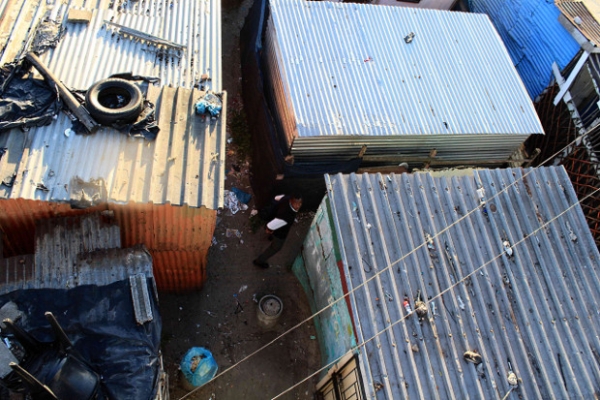

Photo by Masixole Feni.
25 March 2015
Informal settlement residents say they are always told by law enforcement and the Anti Land Invasion Unit that if they want to extend or renovate their shacks, they need to obtain a permit from the City of Cape Town. But what exactly is this permit and how does it work?
The shack extension permit is there to accommodate families where the current space they’re occupying has become insufficient. The permit is meant to prevent the uncontrolled erection of structures or extensions.
According to Benedicta van Minnen, the City’s Mayoral Committee Member for Human Settlements, the permit helps the City to monitor illegal growth in informal settlements. The City’s process pertaining to the extension of structures in informal settlements requires that the City’s Informal Settlements Management Branch is approached for permission to extend structures.
“As many informal settlements are a result of the illegal occupation of land, the extension of structures is, in effect, the further illegal occupation of the land. However, as a City we are trying everything in our power to provide interim relief to our vulnerable residents. The City therefore takes into account that families often need more space. If a family approaches the City to request permission to extend their structure, the City will investigate to see whether it is in effect a request to accommodate family members or not, for instance, [or] for financial gain by expanding a structure to accommodate tenants for financial reasons. If the City finds the request reasonable, the City’s Informal Settlements Management Branch will issue the occupants with an official letter which will include the exact specifications required for the extension,” said Van Minnen.
There are two types of permits, one for permission to renovate (size of structure remains the same) and one for permission to extend. Permission to extend permits are all the same, irrespective of the size the person is applying for.
Nosiphelele Msesiwe lives in an informal settlement in Khayelitsha’s Nkanini. She said what she understands about the permit is that you have to go to the law enforcement offices in Ottery to apply for one.
“You are told by law enforcement when they demolish your structure to go to their offices, where you will have to fill in a form stating that you want to build or extend your shack. It takes a while, sometimes months, for the permit to be approved because they have to go through a process. But once you receive it, you must make sure you have it at all times to show to law enforcement when they ask about your structure, because they patrol regularly around the community and can see when a structure has been erected. For example, a woman in my street built a shack that she wanted to use as a creche, but it was demolished the day after because she had no permit,” said Msesiwe.
Van Minnen said an applicant could apply, at no charge, at any of the four regional offices or approach their field officers on duty who will fill out the application form, conduct an investigation and then submit a recommendation for approval subject to their findings.
“There must be a need for the extension and it can only be for the occupants who currently reside in the specific structure,” said Van Minnen.
Even though Msesiwe said she believed that permits could take months to be approved, Van Minnen said approval for an extension should take a maximum of one week, but if there were discrepancies that needed to be investigated it could take longer.